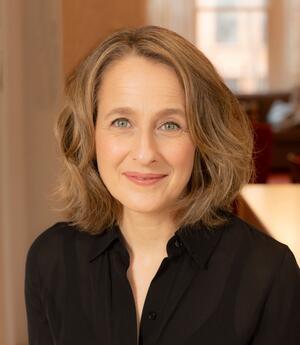7 Questions For Julie F. Kay
JWA chats with Julie F. Kay, an internationally recognized human rights lawyer who successfully argued against Ireland’s ban on abortion, founded the Abortion Coalition for Telemedicine, and now runs the legal arm of the Family Justice Initiative at Footsteps, an organization providing resources to those who leave ultra-Orthodox communities. In recognition of her work as a Jewish leader, Julie was recently named an Elluminate Fellow.
JWA: As the creator and litigator of the landmark case ABC v. Ireland, your work helped catalyze legal abortion in Ireland. How did you conceive this case, and why was it important to you to take it on?
Julie F. Kay: After a number of years as a litigator for the Center for Reproductive Rights, I moved to Ireland in 2000, thinking I would try something new. But I couldn’t resist the opportunity to challenge Ireland’s retrograde anti-abortion law.
Although Irish law was progressive and embraced a human rights model, the Irish Constitution prohibited abortion—a result of a 1983 referendum backed by the politically powerful Catholic Church. As a result, thousands of women annually made the “Irish journey” to England to get abortions in secrecy and isolation.
From my work in the US, I knew litigation could be a powerful tool for social change when done in concert with political and mass movement work. I designed a lawsuit on behalf of three women at the European Court of Human Rights and joined forces with the Irish Family Planning Association. Together, we created a strategy that framed the fight for access to abortion as a key part of the human rights of autonomy, equality, and privacy.
Once we had a positive ruling from the Court, the work came together. Our initiative built on decades of work by grassroots activists and leveraged the political power of newly elected women parliamentarians, who would not be silenced by the criminalization of abortion, and public dismay regarding the harmful effect that the abortion ban had had on women’s health. In 2018, the Irish people voted 66.4% to 33.6% to amend the constitution and make abortion legal.
JWA: With Roe v. Wade now overturned in the US and attacks on reproductive rights becoming more frequent and larger in scale, what do you think American organizers and lawyers can learn from your work abroad?
JK: First, I think it’s so important to recognize that Americans are not the first ones in the world to experience the harms of criminalizing abortion. There are so many models of success in providing care in extreme circumstances and of overturning bans. We need to have conversations with our global allies. And most importantly, we need to speak about abortion as a key aspect of the human right to determine whether, when, and with whom to have a child or not.
It is just intuitive to so many people that the ability to control one’s own decision-making on these fundamental matters is a basic human right, and yet we falsely consider abortion a “controversial” or “religious” matter and stay quiet. We need to be loud that reproductive freedom is a human right—that is what has worked globally and will help us to a new era in the United States as well.
JWA: You are a co-founder and the executive director of the Abortion Coalition for Telemedicine (ACT). Tell us about the mission of ACT and if there are ways to get involved.
JK: The Abortion Coalition for Telemedicine is the only nationwide advocacy organization working to proactively advance telemedicine abortion in all 50 states. Telemedicine can now be provided safely, legally, and affordably nationwide by licensed providers in seven states that have passed telemedicine abortion shield laws. ACT provides these dedicated clinicians with the direct legal and technical support needed to operate an interstate telemedicine practice. We work to close the abortion accessibility gap for all patients—regardless of their zip codes.
However, ACT knows that the anti-abortion movement is determined to eradicate telemedicine abortion and to severely limit medications for abortion and miscarriage care overall, despite the risk to women’s health and the broad political support for abortion rights nationwide. So we must work diligently to protect telemedicine. At ACT, we need everyone to learn more and help spread the word that legal, affordable telemedicine from shield state providers is now an option nationwide. In these key political times, voting for legislative heroes who are bold in their support of reproductive freedoms including telemedicine is a priority at the state, federal, and local levels. And always speak of abortion as a human right for all!
JWA: In your opinion, is reproductive freedom a Jewish value? Why or why not?
JK: My Jewish upbringing and education emphasized standing up for social justice and the importance of helping others to exercise their rights. It inspires me to apply my skills and energy toward creating social change and helps me see how reproductive freedom is an issue of gender, race, and economic discrimination.
The book I co-authored, Controlling Women: What We Must Do Now to Save Reproductive Freedom, exposes how anti-abortion laws are part of a larger attempt to control liberty and bodily autonomy, particularly for the least resourced people in society. In the book, I address how bans on abortion enforce harmful gender norms that are counter to Jewish values of equality and respect for individual families. These bans and restrictions perpetuate greater harm on those women who lack access to quality health care or who face structural racism in accessing care. This inequality stands in opposition to Jewish values for equity. Furthermore, abortion bans often are motivated by religious hierarchies seeking to impose their beliefs on others by using their majoritarian political power.
Jewish values include recognizing that intimate life decisions are for a person to make in consultation with those of their choosing, and not something to be imposed by outside religious or political forces.
JWA: You're also a dedicated advocate for parental justice, defending parents who have left the ultra-Orthodox community and are seeking custody of or visitation with their children and the ability to make decisions about their education. How did you begin this work, and why is it important to you?
JK: In 2017, I had the opportunity to take on a pro bono case of a lesbian woman who was leaving ultra-Orthodoxy to live her life more authentically. Her ex-husband started a custody battle in the Brooklyn Supreme Court seeking to control how she acted and related to her children. For me, this case was a wakeup call—after litigating worldwide, to see that right here in my home state, some women and men were not free to make decisions about how to live and how to parent.
The ultra-Orthodox schools my client’s children were sent to did not provide a basic [secular] education and, furthermore, actively disparaged the mother to the children simply because she was not aligned with their sect of Judaism. The failure to provide a secular education is prevalent in many yeshivas, as a New York Times investigation uncovered, and is a complete violation of a child’s constitutional rights in New York. Unfortunately, judges in New York have demonstrated a disturbing pattern of acquiescing to the ultra-Orthodox parent who prioritizes religious education at the expense of a child’s basic secular education.
As a result of that first case, I joined with Footsteps to start a legal reform initiative as part of the Family Justice program, which seeks to preserve the parenting rights of our members’ children. Footsteps is the only organization in North America that provides a full range of services to people who choose to leave ultra-Orthodoxy. In the five years of the initiative, we have litigated at least a dozen cases using pro bono counsel from major law firms and in partnership with top non-profit legal services groups. We’ve had some significant successes on behalf of individual families, but there is still so much work to do to make sure judges and attorneys in every case honor and uphold the human rights of those leaving ultra-Orthodoxy and their children.
JWA: How do you encourage people who may not identify with the people you're representing to get involved in the cause? For instance, why is it relevant for non-reproductive folks to get involved in abortion access, or for non-Orthodox folks to support Footsteps parents in family courts?
JK: The desire to make our own decisions about the most basic and fundamental familial relationships, including when, whether, and how to parent, is one that is universally understood. In the US, more than half of women who have abortions already have children. While Americans are aware now of what’s at stake in the reproductive rights fight, in contrast, my rights work for Footsteps has “flown under the radar” because our members are fewer in number and politically marginalized.
Yet I have seen that people are very quick to recognize the importance of preserving the bond between a child and a parent once they hear of our members’ plight. Regardless of a person’s background, they find it repugnant that a parent could lose a relationship with their own child simply because of a change in religious orthodoxy, being public about an LGBTQ+ identity, or taking a wider world view than permitted in a religious community. Once people hear that our elected officials and judges are systematically failing to protect that family, they are eager to redress this violation. We’ve had an incredibly diverse group of pro bono lawyers litigating our cases, volunteers, and allies who have all generously supported Footsteps in this groundbreaking work. They share a commitment to social justice and to protecting all families’ fundamental human rights.
JWA: We live in a fast-paced world with an intense and frequently upsetting 24-hour news cycle, particularly when it comes to human rights and reproductive freedom. How do you prevent burnout and stay active in the fight for justice?
JK: Sometimes when the roadblocks look insurmountable, I look backwards to see the progress made in civil and human rights over previous decades. It helps inspire me for the long run and to be more patient, too. If people before me had not started the fight to legalize abortion in Ireland, the case I brought would not have succeeded, and without this work to till the ground years before the referendum win, Irish women might still be making the journey to England for abortions.
I have been lucky to work with a great group of diverse Footsteps colleagues—many of whom have a strong sense of Jewish humor as well— and their camaraderie sustains me. In addition, my clients amaze me in their dedication to living their lives with full access to their rights and their children. I am fortunate to be able to use my professional training to advocate on their behalf.
I will admit that I am concerned about where the US may be heading right now. But I am also optimistic that if we can support and sustain each other for the long haul, dig in, and do and support the work, social justice values will ultimately prevail.







